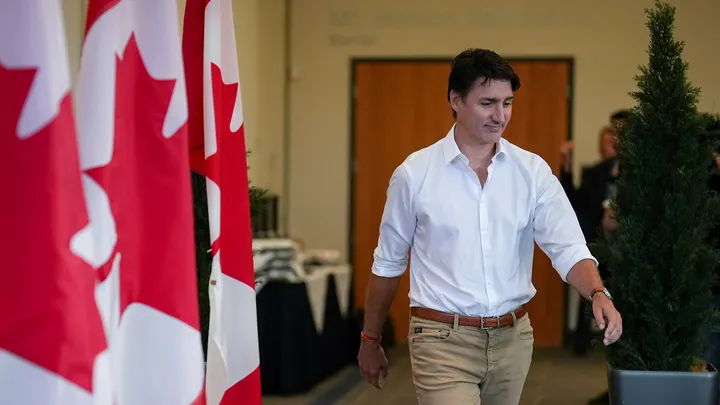Conservative leader Pierre Poilievre has set the stage for a political showdown in Canada, signaling his intention to push for a no-confidence vote against Prime Minister Justin Trudeau’s Liberal government. The move comes as Poilievre’s party leads in recent polls, and he hopes to leverage this momentum to bring down the Trudeau administration. The next federal election is scheduled for October 2025, but this no-confidence vote could trigger an election much sooner.
A Call to Jagmeet Singh and the NDP
At a press conference in Ottawa, Poilievre urged New Democratic Party (NDP) leader Jagmeet Singh to join forces with the Conservatives to support the motion. “Will Jagmeet Singh sell out Canadians again?” Poilievre asked, putting pressure on the NDP leader to make a decisive move. Singh, however, responded cautiously, refusing to commit either way.
“I’ve said that we will look at the vote and make our decision on any vote,” Singh said at a party caucus meeting in Montreal. He added, “Unlike Pierre Poilievre, who wants to play games, we want to get things done for Canadians.” Singh’s refusal to answer before two upcoming byelections only increased political tension.
NDP Withdraws Confidence Agreement
The NDP recently withdrew from a supply-and-confidence agreement with the Trudeau government, a deal that had helped the Liberals maintain power since 2022. Under the agreement, the NDP supported the government in no-confidence votes in exchange for progress on shared policy priorities. Singh announced that this agreement was no longer viable, and the NDP would now evaluate each vote on its own merits.
“We decided we can no longer continue the agreement,” Singh said. “Now we’re back in a standard minority government where we’re going to make a decision based on every vote in front of us.”
The Political Landscape
With Parliament set to resume on Monday, the Trudeau government is preparing for renewed political battles. The Liberal Party currently holds 154 seats in the 338-member House of Commons, with the Conservatives at 119 and the NDP at 24. The Bloc Québécois, which holds 32 seats, may support the Liberals on specific issues, such as increased support for seniors and granting Quebec more immigration powers.
Bloc Québécois leader Yves-Francois Blanchet stated that his party would cooperate if the Liberals addressed these concerns. This establishes a potential alliance that could complicate Poilievre’s plans for a no-confidence vote.
Trudeau’s Response to Internal Criticism
Prime Minister Trudeau faces challenges from opposition parties and within his ranks. Recently, Quebec Liberal MP Alexandra Mendes commented that some of her constituents believe Trudeau should step down as party leader. Addressing these concerns, Trudeau emphasized the importance of diverse perspectives within the party.
“In a democracy, we have all sorts of different perspectives, and that’s important,” Trudeau said. “The reality is, all of us are focused on what to do to ensure Canadians are being supported and feeling confident over the future.”
Upcoming Byelections and Trudeau’s Leadership
Trudeau acknowledged their importance as two critical byelection approaches in Montreal and Winnipeg, stating that byelections allow voters to express their concerns. “It’s a moment where voters can show they are worried. But at the same time, they can show their ambition for the future,” he said.
These by-elections follow the Liberals’ significant loss in June when they were defeated in a Toronto riding they had held for three decades.
The Road Ahead
Pierre Poilievre’s push for a no-confidence vote signals the start of what could be a turbulent political period for Canada. With the NDP now free to evaluate each vote independently and the Bloc Québécois eyeing its priorities, the Trudeau government faces a delicate balancing act. Whether this will result in an early election remains to be seen, but the stakes are high as all parties prepare for the next steps.







